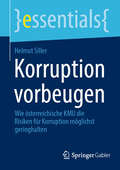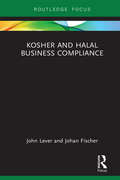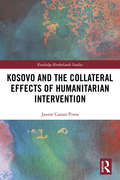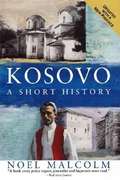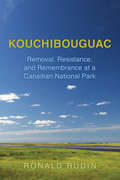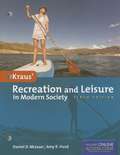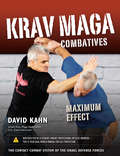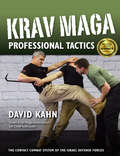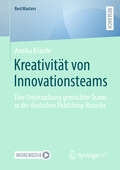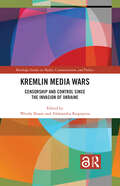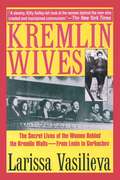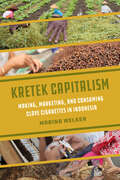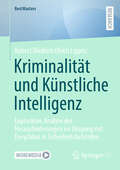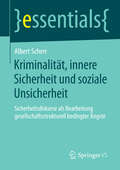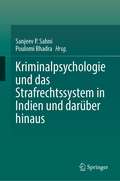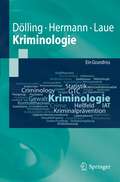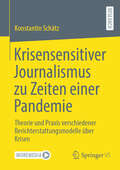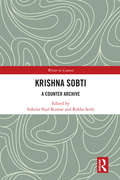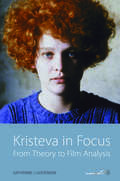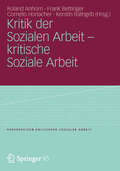- Table View
- List View
Korruption vorbeugen: Wie österreichische KMU die Risiken für Korruption möglichst geringhalten (essentials)
by Helmut SillerDieses essential gibt einen Überblick über Formen und Folgen von Korruption im privaten Sektor. Dabei liegt der Fokus auf Korruptionsprävention in österreichischen kleinen und mittleren Unternehmen (KMU). Sie erfahren in diesem Buch, wie sie mit Korruptionsrisiken umgehen sollten und wie ein durchdachtes Integritäts-Management System davor schützen kann. Dazu werden zunächst Begriffe und rechtliche Hintergründe erklärt, bevor Ursachen von Korruption sowie Möglichkeiten zur Vorbeugung diskutiert werden. Im Anschluss stellt der Autor ein Sieben-Felder-Konzept zur Korruptionsprävention im Detail vor. Er erläutert die einzelnen Maßnahmenfelder und gibt Hinweise zur Umsetzung in der betreffenden Organisation.
Kosher and Halal Business Compliance
by Johan Fischer John LeverKosher is a Hebrew term meaning ‘fit’ or ‘proper’ and halal is an Arabic word that literally means ‘permissible’ or ‘lawful’. Within the last two decades or so, kosher and halal markets have become global in scope and states, manufacturers, restaurants, shops, certifiers and consumers around the world are faced with ever stricter and more complex requirements – most clearly exemplified by Muslim and Jewish groups’ call for kosher and halal certification by third party certification bodies. During this period hundreds of kosher and halal certifiers have emerged around the world, and while thousands of manufacturers, restaurants and shops have been certified, the majority have not. Kosher and halal requirements are comparable, but there are also many differences and the book discusses how these similarities and differences affect production, trade and regulation around the world. The authors research demonstrates that there is a need to address kosher and halal markets simultaneously and answers the question "what characterizes global kosher and halal markets and how can businesses comply with the rising demands and requirements that have emerged?" This is the only book of its kind and it will appeal to manufacturing companies, restaurants and shops that already are or want to be kosher/halal certified. The book can also be assigned in a variety of upper-level undergraduate courses and graduate seminars in business studies, management and marketing. Moreover, the book will be of interest to readers in the natural sciences (for example, food scientists) and outside academia, that is, to state as well as non-state kosher/halal certification bodies, policy makers, interest groups and consultants. Kosher and Halal Business Compliance is accessible in style, global in scope and based on decades of research.
Kosovo and the Collateral Effects of Humanitarian Intervention (Routledge Borderlands Studies)
by Jaume Castan PinosHumanitarian intervention is rising ever higher in international relations discourse, with many publications exploring the nature, legality and success of these interventions. However, less attention is given to what happens after an intervention. This book looks in particular at the implications for territorial and border relations, exploring the case of Kosovo, which in many ways can be seen as a turning point in post-cold war international humanitarian intervention. The 1999 intervention has had significant consequences for Kosovo in terms of political transformations, territorial alterations and enclavisation, none of which was officially intended or foreseen when NATO intervened. Two decades after NATO’s intervention and a decade after unilaterally declaring independence, Kosovo continues to be confronted with daunting existential challenges that inevitably affect the stability of the region, border relations, and the credibility of the organisations operating within Kosovo, namely the UN, the EU and NATO. The book claims that not only is the political and territorial conflict far from being settled, but that the implications have gone beyond Kosovo, creating shock waves which have galvanised conflicts elsewhere. In effect, Kosovo has been used as a pretext, as a legitimation and as an inspiration for those who aspire to challenge the border status quo. The book is primarily aimed at undergraduate and postgraduate students of International Relations and Political Science and as well as Border Studies scholars, but will also appeal to researchers focusing on state-building, peace-building, humanitarian studies, nationalism/secessionism and Balkan studies.
Kouchibouguac: Removal, Resistance, and Remembrance at a Canadian National Park
by Ronald RudinIn 1969, the federal and New Brunswick governments created Kouchibouguac National Park on the province's east coast. The park's creation required the relocation of more than 1200 people who lived within its boundaries. Government officials claimed the mass eviction was necessary both to allow visitors to view "nature" without the intrusion of a human presence and to improve the lives of the former inhabitants. But unprecedented resistance by the mostly Acadian residents, many of whom described their expulsion from the park as a "second deportation," led Parks Canada to end its practice of forcible removal. One resister, Jackie Vautour, remains a squatter on his land to this day.In Kouchibouguac, Ronald Rudin draws on extensive archival research, interviews with more than thirty of the displaced families, and a wide range of Acadian cultural creations to tell the story of the park's establishment, the resistance of its residents, and the memory of that experience.
Krass! Beauty-OPs und Soziale Medien (Essays zur Gegenwartsästhetik)
by Daniel HornuffBeauty-OPs boomen. Weltweit. Und dies nicht zuletzt durch den Aufstieg der Sozialen Medien. Instagram, Facebook und YouTube haben die Körperkultur grundlegend verändert. Heute präsentieren sich Millionen Menschen in Bildern, und ebenso viele betrachten und bewerten diese Bilder. Entsprechend groß ist das Bedürfnis, den Körper ästhetisch zu optimieren, ihn als „krasses“ Ereignis in Szene zu setzen. Vor dem Auftritt im Bild steht daher zunehmend die Arbeit am eigenen Fleisch.Zentral ist die Frage der Gestaltung: Welche Schönheitsnormen werden aufgebaut? Welche verworfen? Wie ist zu erklären, dass solche Operationen einerseits florieren – es andererseits aber noch immer einem Outing gleicht, sich zu ihnen zu bekennen? Welche Vorstellungen von Öffentlichkeit und Intimität, von Geschlecht und Sexualität, von Kultur und Natur werden dabei verhandelt?Ein Essay über die Frage, wie tief das Design in Körper eingreift – und wie sich das Label „krass“ zu einer neuen ästhetischen Kategorie entwickeln konnte.
Kraus' Recreation and Leisure in Modern Society
by Daniel Mclean Amy HurdIt addresses contemporary issues facing the recreation and leisure profession and focuses on challenges and opportunities that impact the profession now as well as years from now. Extensive research into emerging trends helps support the text and provide insights into the future. Focusing on the ten different types of organizations --ranging from nonprofit community organizations and armed forces recreation to sports management and travel and tourism sponsors -- this classic text text is an invaluable resource for students considering a career in the recreation and leisure industry. New to the Tenth Edition: - Discusses how specific trends, such as dramatic shifts in population make-up, the impact of technology, and marketing affect leisure-service systems and the recreation and park professions. - Focus on the role of parks and recreation on the health and wellness of our communities as well as means to combat the obesity epidemic in North America. - Includes new case studies which allow students to apply knowledge of technology in leisure, identify the value and benefits of play, and recognize the changing family structures of our modern society.
Krav Maga Combatives: Maximum Effect
by David KahnBECAUSE NOT ALL KRAV MAGA IS THE SAME® This book is designed for krav maga trainees, security-conscious civilians, law enforcement officers, security professionals, and military personnel alike who wish to refine their essential krav maga combatives, improve their chances of surviving a hostile attack and prevail without serious injury. Combatives are the foundation of krav maga counter-attacks. These are the combatives of the original Israeli Krav Maga Association (Grandmaster Gidon). It is irrefutable that you need only learn a few core combatives to be an effective fighter. Simple is easy. Easy is effective. Effective is what is required to end a violent encounter quickly, decisively, and on your terms. This book stresses doing the right things and doing them in the right way. Right technique + Correct execution = Maximum Effect. Contents include Key strategies for achieving maximum combative effects Krav maga’s 12 most effective combatives Developing power and balance Combatives for the upper and lower body Combative combinations and retzev (continuous combat motion) Combatives for takedowns and throws Combatives for armbars, leglocks, and chokes Whatever your martial arts or defensive tactics background or if you have no self-defense background at all, this book can add defensive combatives and combinations to your defensive repertoire. Our aim is to build a strong self-defense foundation through the ability to optimally counter-attack.
Krav Maga Professional Tactics: The Contact Combat System of the Israeli Martial Arts
by David Kahn Ron JacobsIsraeli krav maga is the official self-defense system of the Israel Defense Forces. Krav maga training shares the same principles for civilians, law enforcement, and military personnel alike to deliver them from harm's way. Goals however, are different for law enforcement and military personnel.This book is designed for security-conscious civilians, law enforcement officers, military personnel, and security professionals alike who want to improve their chances of not just surviving an armed attack, but increase the odds of prevailing without serious injuryKrav maga's popularity in professional law enforcement, military, and security circles is attributable to its practicality, simplicity, quick retention, easy learning curve, and brutal effectiveness. This effectiveness is built on a few core tenets and simple building blocks. General principles are applied and customized to suit the needs of a dynamic violent situation.Contents include:* Mind-sets, reactions, and tactics in response to violence* The highest-level counters against multiple armed attacks and threats* Core kick, clinch, and tackle defenses* Core ground survival tactics* Multiple-opponent strategies and tactics* Impact weapon defenses* Edged weapon defensesFirearm disarms and retention* Includes 954 detailed photographsThe most up-to-date tactics presented in this book focus on the most common violent scenarios. These techniques derive from the author's translation of the Israeli Krav Maga Association (IKMA) curriculum. The IKMA is the governing body for krav maga, recognized by the Israeli government and headed by Grandmaster Haim Gidon.Responsible people seek krav maga training as a shield against violence.
Kreativität in der Unterhaltungsproduktion: Die soziale Praxis der Produktion fiktionaler und nonfiktionaler Fernsehsendungen
by Pamela Nölleke-PrzybylskiKreativität charakterisiert die Fernsehunterhaltungsproduktion. Das vorliegende Buch greift diese Prämisse auf und zeichnet systematisch nach, wie und wo Kreativität im Feld der Fernsehunterhaltungsproduktion tatsächlich eine Rolle spielt – auf der Ebene der Prozesse, der Produkte und der im Feld tätigen Personen. Die Autorin bringt Praxis- und Kreativitätstheorien zusammen und entwickelt auf dieser Basis ein Modell sozialer und spezifisch auch kreativer Praxis im Feld der Unterhaltungsproduktion. Das Modell liefert konkrete Anknüpfungspunkte nicht nur für eine empirische Analyse des Feldes, sondern auch für das Management des Produktionsprozesses.
Kreativität von Innovationsteams: Eine Untersuchung gemischter Teams in der deutschen Publishing-Branche (BestMasters)
by Annika KräutleDie Publishing-Branche ist angesichts der Digitalisierung, disruptiver Technologien und eines sich wandelnden Verbraucherverhaltens mit erheblichen Veränderungen konfrontiert. Klassische Geschäftsmodelle erodieren, wodurch der Innovationsdruck auf Verlage weiter steigt. In diesem dynamischen Umfeld gewinnen kreative, interdisziplinäre Innovationsteams zunehmend an Bedeutung, um die Zukunftsfähigkeit der Verlage zu sichern. In diesem Buch untersucht Annika Kräutle, wie solche Innovationsteams in der deutschen Publishing-Branche optimal besetzt werden sollten, um ihre Kreativität maximal auszuschöpfen. Dabei werden Merkmale wie Alter, Geschlecht und Fachkompetenz der Teammitglieder analysiert, um Rückschlüsse auf eine kreative und effiziente Teamzusammensetzung zu ziehen. Die Arbeit basiert auf einem zweiphasigen Forschungsdesign aus qualitativen Experteninterviews und einer quantitativen Befragung. Ziel ist es, praxisrelevante Erkenntnisse zur Besetzung von Innovationsteams zu gewinnen.
Kremlin Media Wars: Censorship and Control Since the Invasion of Ukraine (Routledge Studies in Media, Communication, and Politics)
by Wendy Sloane Aleksandra RaspopinaThis unique volume brings together academics of Russian journalism and media with journalists and editors who reported or continue to report on the country, to explore and reflect on the changing landscape for journalists in Russia or covering Russia, and the increasing control exerted by the government on independent journalists.Combining rigorous academic research with reflective practitioner essays, the volume investigates the future of reporting in Russia and the implications for the future of the country. It offers an understanding of the experience of independent journalists and media outlets in Russia, as well as other individuals who experience censorship (academics, activists), and examines how the current situation in Russia and people’s experiences of censorship can inform both our theoretical understandings of censorship and information control, in the context of the twenty‑first‑century digital technologies and the policymaking both inside and outside of Russia.Offering important insight into what is happening within Russia’s borders, this volume will appeal to researchers and students of journalism, political science, international relations, propaganda and censorship, mass media, as well as journalists and policymakers.Chapter 4 of this book is freely available as a downloadable Open Access PDF at http://www.taylorfrancis.com under a Creative Commons Attribution-Non Commercial-No Derivatives (CC BY-NC-ND) 4.0 license.
Kremlin Wives: The Secret Lives of the Women Behind the Kremlin Walls—From Lenin to Gorbachev
by Cathy Porter Larissa VasilievaFor over seventy years the Kremlin was the bastion of the all-powerful Soviet rulers. A great deal is known about the men who held millions of fates in their iron grip, yet little is known about the women--the wives and mistresses--who shared their lives. They took part in the Revolution and its aftermath, bore children, and suffered abuse; some were arrested and sent to Siberia, driven to suicide, or even murdered. In 1991 the KGB granted the author access to its secret files, which, together with the author’s own research and interviews, provided the material for this book. Here for the first time the stark and sometimes scandalous truth about these women is revealed. Lenin’s wife worked passionately for the Revolution alongside her husband, from the time of Lenin’s exile until her death. His mistress was also a close friend of his wife. Stalin married Nadezhda Alliluyeva when she was only sixteen. Earlier, he had had a relationship with Nadezhda’s mother, and there is strong evidence that his wife may also have been his daughter. When she was found dead in a pool of blood, the official verdict was suicide, but many believe she was murdered. Secret Police Chief Lavrenti Beria, known as "The Butcher,” roamed the streets in Moscow in a curtain-drawn limousine, stalking young girls who would later be abducted by his agents. One was forced to marry Beria--his wife Nina Teimurazovna. Among the many other Kremlin "wives” portrayed here are: Alexandra Kollontai, feminist and supporter of "free love”; Larissa Reisner, Boris Pasternak’s muse; Olga Kameneva, Trotsky’s sister; Nina Khrushchev; Victoria Brezhnev; Galina Brezhneva; Tatyana Fillipovna Andropov, and Raisa Gorbachev--supposedly the only Soviet ruler’s wife to have married for love.
Kretek Capitalism: Making, Marketing, and Consuming Clove Cigarettes in Indonesia (Atelier: Ethnographic Inquiry in the Twenty-First Century #13)
by Marina WelkerA free ebook version of this title is available through Luminos, University of California Press's Open Access publishing program. Visit www.luminosoa.org to learn more. Indonesia is the world's second-largest cigarette market: two out of three men smoke, and clove-laced tobacco cigarettes called kretek make up 95 percent of the market. Each year, more than 250,000 Indonesians die of tobacco-related diseases. To account for the staggering success of this lethal industry, Kretek Capitalism examines how kretek manufacturers have adopted global tobacco technologies and enlisted Indonesians to labor on their behalf in fields and factories, at retail outlets and social gatherings, and online. The book charts how Sampoerna, a Philip Morris subsidiary, uses contracts, competitions, and gender, age, and class hierarchies to extract labor from workers, influencers, artists, students, retailers, and consumers. Critically engaging nationalist claims about the commodity's cultural heritage and the jobs it supports, Marina Welker shows how global capitalism has transformed both kretek and the labor required to make and promote it.
Kriminalität und Künstliche Intelligenz: Explorative Analyse der Herausforderungen im Umgang mit Deepfakes in Sicherheitsbehörden (BestMasters)
by Robert Diedrich LippitzKünstliche Intelligenz führt zunehmend zu gesamtgesellschaftlichen Veränderungen, die unweigerlich auch kriminelle Handlungsweisen umfassen. Ein vergleichsweise neues Phänomen ist dabei die Nutzung von Deep Learning Software zur Erstellung authentisch wirkender, aber gefälschter, digitaler Inhalte – sog. Deepfakes. Diese bieten neben legitimen Anwendungsbereichen auch Möglichkeiten zur Optimierung vorhandener und Innovation neuer Modi Operandi, welche insbesondere Betrugsdelikte, Meinungsbeeinflussung und die Erstellung pornografischer Inhalte umfassen. Diese Ausarbeitung verfolgt das Ziel, ein tiefgreifendes Verständnis des Phänomens Deepfakes zu vermitteln, relevante Herausforderungen zu identifizieren und potenzielle Lösungsansätze aufzuzeigen. Die Studie kombiniert eine Literaturanalyse aus deutschsprachigen und angloamerikanischen Publikationen mit semistrukturierten Interviews mit Personen, die über praxisnahe Expertise verfügen. Anhand der empirischen Untersuchung konnte festgestellt werden, dass ein fundamentaler Bedarf an Aufklärung und Bildung besteht, um die gesellschaftliche Resilienz gegenüber den Herausforderungen von Deepfakes zu stärken.
Kriminalität, innere Sicherheit und soziale Unsicherheit: Sicherheitsdiskurse als Bearbeitung gesellschaftsstrukturell bedingter Ängste (essentials)
by Albert ScherrDer vorliegende Beitrag zeigt Unterschiede zwischen neoliberalen und wohlfahrtsstaatlichen Strategien im Umgang mit sozialer Unsicherheit auf und argumentiert, dass die Entwicklung in Deutschland nicht angemessen verstanden werden kann, wenn Ähnlichkeiten zu den USA betont, Unterschiede nivelliert werden. Dargelegt wird weiter, dass kein direkter und zwangsläufiger Zusammenhang zwischen einer Zunahme sozialer Unsicherheit und steigender Kriminalitätsfurcht angenommen werden kann. In Hinblick auf die sozialwissenschaftliche Forschung wird argumentiert, dass eine einflussreiche ,Logik des Verdachts', die eine Zunahme von Kriminalität als verstehbare Folge von Armut, Arbeitslosigkeit und sozialer Ausgrenzung erwartet, problematisch ist, da sie zur Begründung von Bedrohungsszenarien beiträgt, mit denen neoliberale Konzepte gerechtfertigt werden, die soziale Sicherheit durch Ordnungspolitik gewährleisten wollen.
Kriminalpsychologie und das Strafrechtssystem in Indien und darüber hinaus
by Sanjeev P. Sahni Poulomi BhadraDieses Buch bietet einen gezielten und umfassenden Überblick über die Kriminalpsychologie in verschiedenen sozioökonomischen und psychosozialen Kontexten. Es informiert die Leser über die Rolle der Psychologie in den verschiedenen Aspekten des Strafrechtsprozesses, angefangen von der Untersuchung einer Straftat bis hin zur Rehabilitation oder Wiedereingliederung des Straftäters. Aktuelle Forschungsergebnisse aus Kriminologie und Psychologie werden erörtert, um die Psyche verschiedener Straftäter zu verstehen, wie man mit ihnen während der Ermittlungen und der Verurteilung effektiv interagieren kann und wie man positive Veränderungen in den verschiedenen Phasen des Strafrechtsprozesses - Ermittlungen, Strafverfolgung, Inhaftierung, Rehabilitation - herbeiführen kann, um die Effizienz des Strafvollzugs zu erhöhen und das Vertrauen der Öffentlichkeit in das Justizsystem zu stärken. Das Buch befasst sich eingehend mit den größeren Problemen einer ganzheitlichen Reduzierung des Anstiegs der Kriminalitätsrate und der Anfälligkeit der Gesellschaft. Jedes Kapitel stützt sich auf führende wissenschaftliche Arbeiten westlicher Wissenschaftler auf diesem Gebiet und ergänzt diese Theorien mit Forschungsergebnissen aus südasiatischer Sicht, insbesondere aus dem indischen Strafrechtssystem. Dieses Buch fasst erfolgreich die Grundlagen der kriminalpsychologischen Literatur zusammen, während es gleichzeitig interdisziplinäre Studien über kriminelles Verhalten und Rechtspsychologie einbezieht und die Lücken des Justizsystems sowie Möglichkeiten für alternative Strafvollzugs- und Rehabilitationsprogramme in den provinziellen Diskurs einbringt.
Kriminologie: Ein Grundriss (Springer-Lehrbuch)
by Dieter Hermann Christian Laue Dieter DöllingDas Lehrbuch vermittelt die Grundlagen der Kriminologie (Begriff, Geschichte und Methoden), erläutert die Kriminalitätstheorien und arbeitet zentrale Befunde zum Verbrechen, zu Tätern und Opfern von Verbrechen sowie zur Verbrechenskontrolle (Kriminalprävention und Strafrechtspflege) heraus. Sodann werden wichtige Deliktsbereiche unter kriminologischen Gesichtspunkten dargestellt. Statistische und methodische Grundlagen empirisch-kriminologischer Untersuchungen werden jeweils berücksichtigt.
Krisen des Feldzugangs: Methodologische, empirische und forschungspraktische Beiträge (Wissen, Kommunikation und Gesellschaft)
by Sylvia Marlene Wilz Max KaufmannDieses Buch bietet eine ausführliche und aktuelle Auseinandersetzung mit der Frage, wie der Zugang zum Forschungsfeld gelingen kann. Der Feldzugang ist eine notwendige Bedingung, um Feldforschung betreiben zu können – gelingt der Zugang zum Feld nicht, dann ist auch die geplante Forschung nicht möglich. Das Anbahnen eines Feldzugangs ist entsprechend eine besonders kritische Phase des Forschungsprozesses, die grundsätzlich die Eigenschaft hat, krisenhaft zu sein oder es zu werden. Diesen Sachverhalt stellt der Band in den Mittelpunkt und versammelt Beiträge, die das krisenhafte Potential von Feldzugängen aus drei Perspektiven diskutieren: Erstens mit Blick auf veränderte und erschwerte äußere Rahmenbedingungen qualitativer Forschung (Der Feldzugang in der Krise); zweitens aus einer wissenssoziologischen Sicht (Der Feldzugang als krisenhafter Prozess) und drittens aus der Perspektive der Forschungsfelder und -gegenstände (Der Feldzugang als Krise für den Forschungsgegenstand?). In dieser Diskussion verfolgt der Band das Ziel, Feldzugänge sowohl unter forschungspraktischen und methodologischen Gesichtspunkten zu erörtern als auch den Feldzugang als Forschungsgegenstand zu reflektieren. Der Band gibt Anregungen für alle, die ein empirisches Forschungsprojekt durchführen wollen und für die diejenigen, die ihre eigene Forschungspraxis selbstreflexiv thematisieren. Er bietet Anschlüsse an die ethnografische Literatur, Einblicke in die Arbeit der ethnografischen Feldforschung, und er bietet wichtige Impulse für die Debatte zur Zukunft der qualitativen Sozialforschung.
Krisenmanagement am Beispiel der Flüchtlingslage 2015/2016: Akteure, Zusammenarbeit und der Umgang mit Wissen (Sicherheit – interdisziplinäre Perspektiven)
by Frank Fiedrich Patricia M. Schütte Yannic Schulte Malte SchönefeldIn diesem Open-Access-Buch werden Erfahrungen zur Zusammenarbeit und zum Wissensmanagement verschiedenster staatlicher, gemeinnütziger und privater Akteure in der Flüchtlingslage 2015/16 aufbereitet, mit praxisnahen Beispielen angereichert und um Übungen zur Vorbereitung auf zukünftige Lagen ergänzt. Die damalige Lage stellte die Beteiligten vor große Herausforderungen, sowohl im Hinblick auf Kooperationen als auch den Wissensaustausch mit anderen. Wie die Akteure damit umgingen, welche Erfolge und Misserfolge sich dabei einstellten und was sie daraus gelernt haben wird hier thematisiert.
Krisensensitiver Journalismus zu Zeiten einer Pandemie: Theorie und Praxis verschiedener Berichterstattungsmodelle über Krisen
by Konstantin SchätzDer Journalismus hat in der Berichterstattung über die Covid-19-Krise versagt. Diese Meinung vertreten viele aus unterschiedlichen Bereichen der Gesellschaft. Ausgehend von der Medienkritik wird in diesem Buch die Qualität der Berichterstattung ausgewählter deutscher und österreichischer Medien in Krisenzeiten geprüft. Dazu bedarf es unterschiedlicher Modelle, Theorien und Ansätze, mithilfe derer sich Qualität von Journalismus bewerten lässt. Dabei sind nicht nur Erkenntnisse wichtig, die in der kommunikationswissenschaftlichen Auseinandersetzung mit Journalismus gesammelt wurden. Auch psychologische Modelle und Diskussionen aus der Praxis um Ethik und gesellschaftliche Rollen von Medien sind zentral. Die Annahme, dass unterschiedliche Phasen einer Krise berücksichtigt werden müssen, ist ein zentraler Bestandteil dieser Analyse. Auf Grundlage der erarbeiteten Erkenntnisse steht die Frage im Mittelpunkt, wie Medien in Zeiten einer Krise berichten müssen, um ihrer sozialen Verantwortung nachzukommen und gesellschaftlicher Verunsicherung im besten Fall sogar entgegenwirken zu können. Ziel der Forschung ist die Erarbeitung eines Kriterienkatalogs, die Untersuchung der Berichterstattung in Zeiten der Pandemie und damit auch die Überprüfung der geäußerten Medienkritik.
Krishna Sobti: A Counter Archive (Writer in Context)
by Sukrita Paul Kumar Rekha SethiThis book engages with the life and works of the distinctive Hindi writer Krishna Sobti, known for making bold choices of themes in her writing. Also known for her extraordinary use of the Hindi language, she emerges as an embodiment of a counter archive. While presenting the author in the context of her times, this volume offers critical perspectives to define her position in the canon of modern Indian literature. Alongside important critical essays on her, the inclusion of excerpts from the translations of some major works by the author, such as Zindaginama, Mitro Marjani and Ai Ladki, greatly facilitate an understanding of her worldview and the contexts in which she wrote. Also included in this book are some of her reflections on the creative process that help in unfolding the complexities of her characters and her specific approach to the language of fiction. Writing in the times of significant political and cultural churnings, her fiction includes themes such as the Partition of the country and its aftermath, women and their sexuality, desire and violence, history and memory. Her writing subverted the dominant narratives of the times and de-historicised history. Her own essays and other critical writings demonstrate the way Krishna Sobti’s characters are abundantly polyphonic and seeped in social realities. They encapsulate the cultural milieu of their times and serve as a site of resistance to the dominant archive of power. Her interactions with her fellow Hindi writers such as Nirmal Verma and Krishan Baldev Vaid, as also her letters, her memoirs and the reminiscences of others, further enrich this volume and establish her unique voice. Part of the ‘Writer in Context’ Series, this book will be useful for scholars and researchers of Indian literature, English literature, postcolonial studies, cultural studies, gender studies, translation studies and Partition studies.
Kristeva In Focus
by Katherine J. GoodnowDealing with some of the major themes in film narratives, this book draws on the theories of French psychoanalyst Julia Kristeva. It looks at how narratives have changed over time, and considers the sources of our variable reactions to themes and representations of horror, strangers, and love. In addition to a selection of contemporary mainstream films, the major films for analysis are New Zealand "New Wave" films such as Alison Maclean's Kitchen Sink and Crush; Vincent Ward's Vigil; and Jane Campion's Sweety, An Angel at My Table, and The Piano.
Kritik der Digitalität (Medienwissenschaft: Einführungen kompakt)
by Jan DistelmeyerDie Auseinandersetzung mit Digitalität gehört zu den dringlichsten Herausforderungen der Gegenwart. Die zunehmende Bedeutung und Ausbreitung von Computertechnologie fordert nicht nur Gesellschaften und Individuen heraus – diese Entwicklung setzt auch das Konzept der Digitalität unter Druck, das die Gesamtheit und Eigenart der Bedingungen und Folgen elektronischer Digitalcomputer (in all ihren Formen) zu fassen versucht. Gerade weil jedoch Digitalität alltäglich ist, sollte es ihre Kritik, ihre Analyse und Beurteilung, auch sein.Wie kann eine Analyse sowohl grundsätzlichen Charakteristika als auch sich wandelnden konkreten Formen, Infrastrukturen und Praktiken gerecht werden? Wie prägen die Entwicklungen einer Digitalisierung, die Formen von Vernetzung, Einbettung und Autonomisierung programmatisch umfasst, Medien, Kulturen und Gesellschaften? Wie verhalten sich „künstliche Intelligenz“ und „algorithmische Regierung“ zueinander, wie passt die Immaterialität "des Digitalen" zur Materialität der Computer? Wie vermittelt sich der im Wandel begriffene Status und Wirkungsbereich dieser Technik?Dieser Band führt in laufende Debatten ein und entwickelt einen eigenen Ansatz zur Kritik der Digitalität, der nach Formen von Interfaces und Prozessen des Leitens fragt.
Kritik der Sozialen Arbeit - kritische Soziale Arbeit (Perspektiven kritischer Sozialer Arbeit #12)
by Roland Anhorn Frank Bettinger Cornelis Horlacher Kerstin RathgebEine Soziale Arbeit, die für sich 'Kritik' bzw. 'kritisch' als konstitutive Bestandteile ihrer Selbstbeschreibung reklamiert, muss sich der – nie abgeschlossenen – Zumutung einer Selbstvergewisserung aussetzen, die auf die systematische Reflexion der gesellschaftlichen Bedingungen, den sozialen Ort, die Funktion, die Folgen und den Inhalt von 'Kritik' gerichtet ist. Die Notwendigkeit, in eine neue Phase der Selbstreflexion kritischer Sozialer Arbeit einzutreten, stellt sich umso mehr, als im Zuge der neoliberalen Restrukturierung der Gesellschaft und der sie begleitenden Theorie- und Wissensproduktionen 'Kritik' nicht nur ihre Selbstverständlichkeit verloren hat. 'Kritik' in einem substanziellen Sinne ist darüber hinaus in ihren wissenschaftlichen Bekundungen nahezu beliebig und ihren praktischen Konsequenzen weitgehend unverbindlich geworden. Vor diesem Hintergrund macht es sich der Sammelband zur Aufgabe, die – durchaus kontroversen – Grundlagen für einen substanziellen Begriff von 'Kritik' zu entwickeln.
